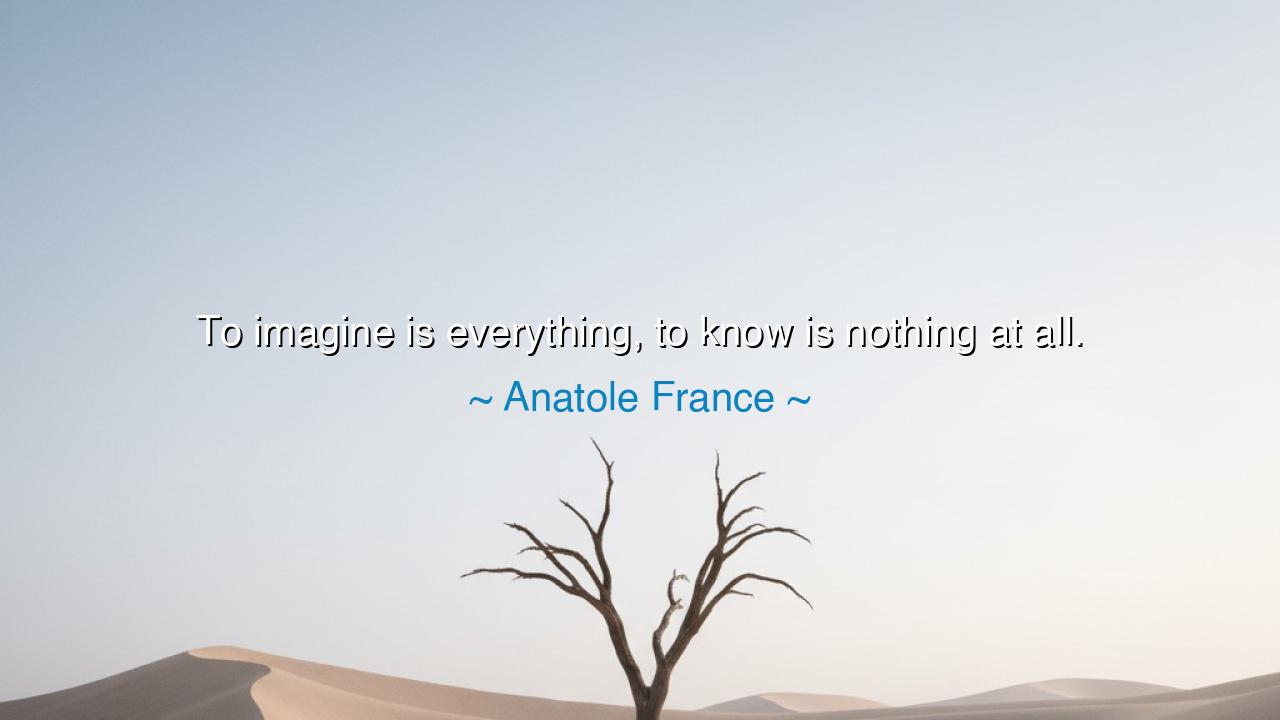
To imagine is everything, to know is nothing at all.






"To imagine is everything, to know is nothing at all." Thus spoke Anatole France, the philosopher of words and dream, whose insight pierces to the heart of the human condition. In this radiant paradox, he reminds us that knowledge, though powerful, is a pale shadow beside the living flame of imagination. Knowledge deals with what is—with what has already been measured, classified, and tamed. But imagination dares to touch what might be; it reaches beyond the boundaries of fact and calls forth new worlds. France teaches us that the human spirit does not thrive on certainty, but on wonder—that the creative act, the act of envisioning, is the true breath of life.
The origin of this thought springs from France’s lifelong devotion to literature and art, those sacred mirrors of human imagination. Born in the 19th century, he lived in a time of great scientific progress and rational pride, when men began to worship knowledge as the new god. Yet Anatole France, though a scholar himself, saw that this pursuit of pure intellect often led to sterility of the soul. He warned that knowing without imagining is like holding a map of the stars but never lifting one’s eyes to the heavens. For knowledge alone does not move mountains; it is imagination that first dreams the summit and gives mankind the will to climb.
In truth, all that humanity has ever achieved began not with knowledge, but with vision. Before the wheel was crafted, before the ship set sail, before the first fire was lit—someone imagined. The great discoveries of science and the profound creations of art are born from the same sacred source: the ability to see what is not yet real. Knowledge follows imagination as the shadow follows the flame. Einstein, who himself worshipped the creative mind above all, once said, “Imagination is more important than knowledge. For knowledge is limited, but imagination encircles the world.” Thus, even the man who unlocked the secrets of the universe bowed before the same truth Anatole France proclaimed: that imagination is the wellspring of all human greatness.
Consider the story of Leonardo da Vinci, that timeless embodiment of France’s wisdom. Leonardo’s notebooks were filled not only with sketches of what he observed, but with dreams of what had never existed: flying machines, mechanical knights, engines, and visions of anatomy centuries ahead of his time. He did not “know” these things—they were not yet proven or possible—but he imagined them. His genius was not in the precision of his studies, but in the boundless reach of his vision. It was his imagination that leapt where knowledge could not yet walk, and it is that leap that defines the true creator. For all the facts of his era have faded into dust, but Leonardo’s imagined worlds still breathe in ours.
And yet, Anatole France does not dismiss knowledge out of scorn; he warns against its idolatry. Knowledge, when worshiped as an end in itself, grows rigid. It becomes a wall instead of a window, a tool of pride instead of wonder. The man who clings only to what he knows imprisons himself within yesterday’s truth and blinds himself to tomorrow’s possibility. Imagination, by contrast, is the wind that breaks the walls of limitation. It makes the soul childlike again—curious, daring, alive. To imagine is to remain forever open to life’s unfolding mystery, while to cling to knowledge is to mistake the map for the journey.
In this way, France’s teaching is not merely philosophical—it is deeply spiritual. To imagine is to partake in creation itself, to echo the divine act that brought the universe into being. Every artist, inventor, lover, and dreamer is a co-creator with the infinite. To imagine peace where there is war, beauty where there is ruin, hope where there is despair—this is the essence of being human. Knowledge catalogs the world; imagination redeems it. When man ceases to imagine, he ceases to evolve, and his spirit begins to die long before his body.
So, my children of thought and flame, take this lesson as a sacred inheritance: do not worship knowledge—use it as your servant, but let imagination be your master. Seek not only to learn what others have known, but to dream what no one has yet dared. When you read, do not stop at comprehension; let your mind wander into creation. When you see the world as it is, ask what it could become. For the mind that knows is clever, but the heart that imagines is eternal.
For as Anatole France declared, “To imagine is everything, to know is nothing at all.” Do not fear the unknown; embrace it as the cradle of all creation. Knowledge may give you comfort, but imagination will give you wings. Dream boldly, my friends, for every step of progress, every act of love, every birth of beauty begins first in the unseen realm of imagination—and from that sacred vision, the world is made anew.






AAdministratorAdministrator
Welcome, honored guests. Please leave a comment, we will respond soon